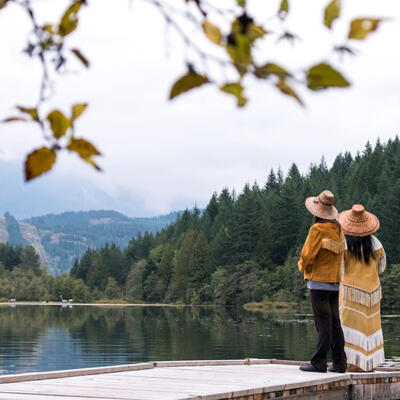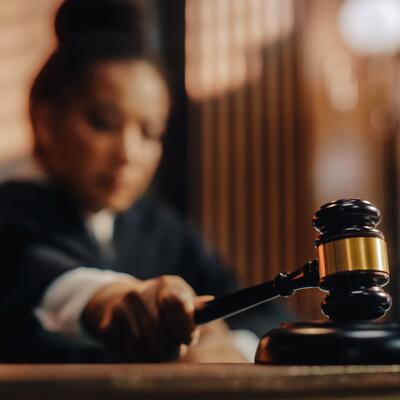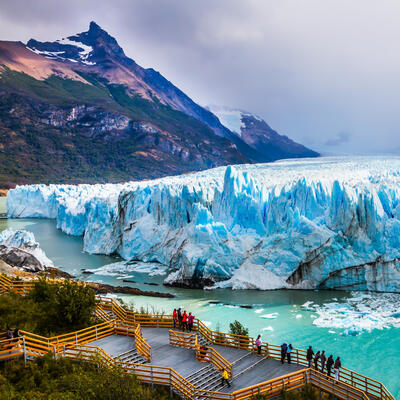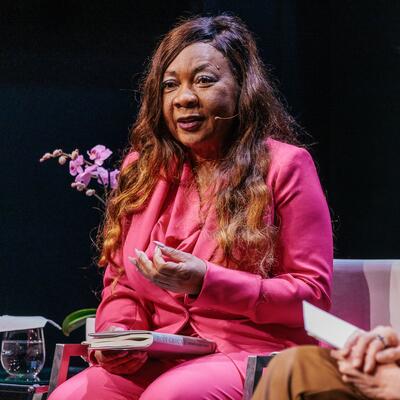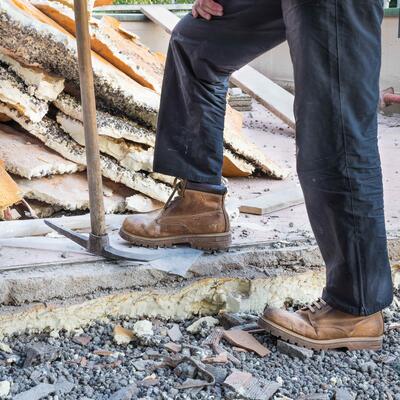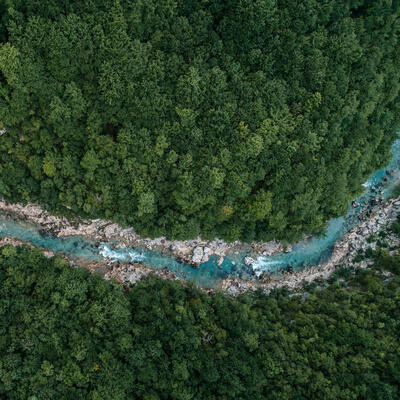
REWIND: Should Nature Have Rights?
Guests

Lindsey Schromen-Wawrin
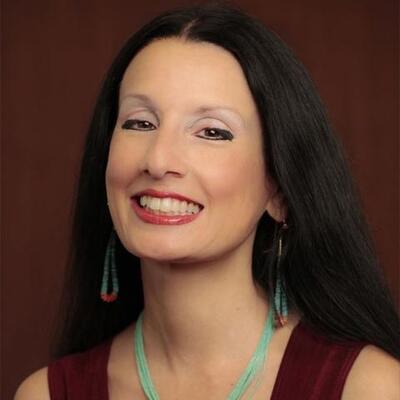
Rebecca Tsosie
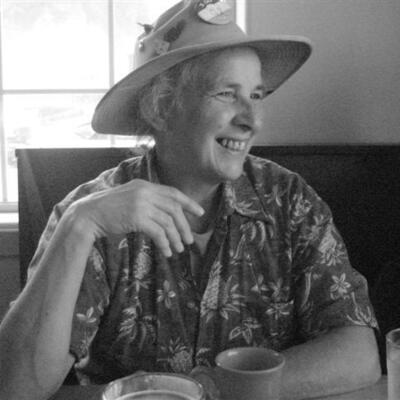
Carol Van Strum
Summary
In the last several years, a growing number of countries and places within the United States have tried to establish legal standing for natural ecosystems.
“The concept really posits that the way that we envision a person having particular rights and standing to sue in case somebody harms you, that that can be extended beyond human persons to aspects of what we would describe as the natural world and ecosystem: a river, a mountaintop, a national park, whatever the case may be,” says Rebecca Tsosie, a Regents professor of law at the University of Arizona.
In 2017, New Zealand granted the Whanganui River the full legal rights of a person. India granted full legal rights to the Ganges and Yamuna rivers, and recognized that the Himalayan Glaciers have a right to exist. In the United States, those efforts have been more complicated, and frequently overturned by courts.
Lindsey Schromen-Wawrin, a lawyer who has worked with the Community Environmental Legal Defense Fund, says the rights of nature concept has moved from an “unthinkable” idea a few years ago to now exploring the details of “how would this actually work? What are the legal mechanisms by which this works?”
He says those mechanisms will determine whether the rights of nature becomes a paradigm shift or “simply recuperates a system that is ultimately destroying the earth on which we depend.”
For example, a legal person usually has the right to sue and be sued.
“Should ecosystems have that same set of personhood rights, or should it be different? I think that we should be very careful about the idea of ecosystems being able to be sued or being able to have liability,” Schromen-Wawrin says.
Decades ago, Carol Van Strum’s legal battle opposing the use of herbicides in her local national forest eventually led to a ban on aerial herbicide spraying on national forests across the country.
More recently, she and others in Lincoln County, Oregon, organized a measure banning the use of aerial spraying of pesticides on corporate timberlands, using the rights of nature argument. Voters passed the measure in 2017 but the timber companies immediately challenged it in court. The judge ruled that state law preempted the local ordinance.
Van Strum’s group appealed the decision, but in 2021, the Oregon Supreme Court opted not to hear the Lincoln County case, upholding the trial court decision allowing for the continued use of aerial pesticides and denying the ability of the Siletz River watershed to be seen as a rightful party.
Related Links:
Full Transcript
Greg Dalton: This is Climate One. I’m Greg Dalton. Western law generally treats the natural environment as property, with all rights resting with its owners:
Lindsay Schromen-Wawrin: If we’re treating ecosystems as property, then ultimately, we as property owners have the right to destroy our property. And that fundamentally has to change.
Greg Dalton: If corporations can be legal persons, why can’t Mother Earth? And who should defend the rights of our collective natural resources?
Rebecca Tsosie: What are the rights and responsibilities of individual owners versus the government’s obligation to preserve those resources? Or at least some decent quality of the resource because we all rely on that -- we can’t live without water or air.
Greg Dalton: Exploring the rights of nature. Up next on Climate One.
Greg Dalton: Can a forest or river have legal rights of its own? I’m Greg Dalton. In the last several years, a growing number of countries and places within the US have tried to establish legal standing for natural ecosystems. In 2017, New Zealand granted the Whanganui [whong-ah-noo-ee] River the full legal rights of a person. India also granted full legal rights to the Ganges and Yamuna rivers, and recognized that the Himalayan Glaciers have a right to exist. In the United States, those efforts have been more complicated, and frequently overturned by courts. I’ve invited two guests to talk through the history and complexities of the rights of nature. Lindsey Schromen-Wawrin is an attorney who’s worked with the Community Environmental Legal Defense Fund on multiple rights of nature efforts. His clients have included the Lake Erie Ecosystem and the Crystal Springs Ecosystem. Rebecca Tsosie is a Regents Professor at the University of Arizona College of Law. Tsosie is of Yaqui descent, and faculty co-chair of the university’s Indigenous Peoples’ Law and Policy Program. I asked Rebecca Tsosie how her thinking about the rights of nature has evolved over time. She says it wasn’t something she thought about much until she started studying law.
Rebecca Tsosie: Law school is actually a happy accident for me; there wasn’t anybody in my family that had ever gone to university or law school. And when I got into my field which is Federal Indian Law and the rights of Indigenous peoples, I was so taken with the rights discourse. And this idea of human rights and civil rights that became one of the cornerstones for my scholarship. So, I have since learned to appreciate the discourse of rights in general and the rights of nature of course is a part of that discourse. But I think it’s a stretch for the American imagination to go into the rights of nature because we usually associate them with persons.
Greg Dalton: Right. And we’ll get into kind of the common roots, the very existence of a human, you know, initiate some rights and the very existence of nature kind spawn some right, so to speak. But how do you explain the rights of nature as a concept?
Rebecca Tsosie: So, the concept really posits that the way that we envision a person having particular rights and standing to sue in case somebody harms you, that that can be extended beyond human persons to aspects of what we would describe as the natural world and ecosystem, a river, a mountaintop, a national park, whatever the case maybe. So, it is to have an entity with standing to sue. Now, it’s not such a stretch because we actually do obviously think of corporations as legal persons and we think of, you know, a ship can be a legal person. So, we do have these categories in the law of inanimate objects that can have personhood in a legal sense.
Greg Dalton: But isn’t the right of a corporation to as personhood relatively new? I always remember Stephen Colbert saying that I'll believe a corporation is a person when Texas executes one, right. So, isn’t that relatively new?
Rebecca Tsosie: No. Actually, the legal status is the collective acting as an individual. So, the way that corporations are set up is as individual legal entity with status. And obviously the individual shareholders are part of that. So, we have a group that is represented by that legal identity.
Greg Dalton: Okay.
Rebecca Tsosie: I think the novel twist in the modern era has been to think of what we, you know, term the rights that are, you know, core to individuals -- freedom of speech, freedom of religion -- and all of a sudden you extend those rights to corporations. Well, that’s different than the types of legal status rights that go with the property or contract transaction. So, it is that part that is newer in the jurisprudence.
Greg Dalton: Right. From recently Citizens United or whatever, yeah. Lindsey, how did you come to be interested in the rights of nature?
Lindsey Schromen-Wawrin: As an undergraduate student I was an environmental studies major, and that often focuses on environment, economy and society. And we didn't really get into the structure of the law and how it shapes the way that we think about the natural world or about ecosystems or the planet in general. In my 20s I taught field science education and I, you know, we would teach students definition of ecosystems about the all the parts of the living and nonliving world. Sometimes I’d have a student, always an Indigenous student who would say what do you mean, non-living parts of the natural world? And I would be like I know what you mean just if you’re asked this on the Washington State standardized tests, just put that down but you don't have to believe it, you know. And I found myself wanting to do more structural social change work. So, I ended up going to law school because I was like well if I wanna change the system I better know what the system is, and found that I was going to go to Spokane where the Community Environmental Legal Defense Fund had been doing some work in the previous year or so. So, I signed up for the democracy school. I was exposed of this idea rights of nature and kind of the structure of law that gives corporations more power than people and our ability to protect our communities as well. And I was very skeptical I mean I was a science educator, right, so skepticism. And I’m like this can't be how we’ve structured our legal system. And I you know, no spoiler alerts, but like you don't cover this stuff in law school. The whole first year of law school is really about reasonableness, it's not about justice. And so, my first summer of law school I worked on a signature gathering campaign to put an initiative onto the Spokane city charter like the Constitution for the city. And it included rights of nature for the Spokane River. And one point outside the grocery store and I'm standing there collecting signatures and I think for context I’m a white guy with white skin privilege. And this woman who appeared to be Indigenous is walking into the store and I say, hey would you like to sign this initiative to give rights to give the Spokane River the right to exist? And she stops and she looks at me and she says, you're finally figuring that out.
Greg Dalton: Yeah, right. For centuries, yeah, finally figuring that out. So, how did you feel in that moment? Did you just kind of drop, feel shamed or chagrined.
Lindsey Schromen-Wawrin: Well, she signed it. No, I mean, yeah, it's this thing we’re finally figuring this out. In Western legal systems, Western thought is really slow to this and so we have to unpack hundreds of years of the way that we think about our relationship to the earth in order to get to this paradigm shift that rights of nature represents. Another time that summer I was gathering signatures at a festival and this guy comes up and really wants to read the text of the entire thing, so I let him read it. And then he comes back and he points at the rights of river provision and he says, you know this goes against 500 years of Western property law? And I pause and I think, is it only 500 years or is it further? But I just say yes, and he's like, I'm glad because that is what we have to do and he then shares that he is a lawyer and he remembers that first day of property law class when the professor explains what property is. And it includes things like the right to use your property, the right to transact your property, the right to exclude others from using your property. And ultimately it includes the right to destroy your property. So, if we’re treating the earth and if we’re treating ecosystems as property, then ultimately, we as property owners have the right to destroy our property and that fundamentally has to change.
Greg Dalton: Rebecca, what did you learn about property law in law school and coming in with your perspective?
Rebecca Tsosie: I think Lindsey is absolutely right that that is how the American legal system works. We inherited it from Great Britain. And Blackstone's version of property was one of absolute despotic ownership: the owner could do anything. And so, we imported that into the United States. But the interesting thing is in the context of this conversation to imagine what the rights are to what we are framing in US law and international law as resources. Water resources, air resources, wetlands resources, species, animals, plants, resources. What are the rights and responsibilities of individual owners versus the government’s obligation to preserve those resources or at least some decent quality of the resource because we all rely on that. We can't live without water or air. So, what is the government’s obligation and how do we frame that as against this absolute notion of property right. So, we have mass movements now around public lands for example, on both sides of that equation that the government ought to protect these lands for the collective benefit. The controversy over Bears Ears National Monument, for example, you know, local people there said, hey, we want to be able to develop that. We want to be able to engage in fracking and we can lease these lands so we can make money off it and the whole commodification thing versus the value of that place is immeasurable as it sits there as the site of all of those affiliated Indigenous nations that have always been part of that place. And that was the beauty of the proclamation that President Obama established because he said, these are current living nations they’ve always been here, the knowledge about that place is invaluable and they will have a seat at the table with the federal agencies in a co-management regime of something that is precious as a national resource. And I think that you saw that for example in the climate litigation, the Juliana case, that idea that there’s an atmospheric trust that one generation doesn’t have the right to take away the right of the future generations to survive. And that is a pivotal concept that within many Indigenous traditions and I know Oren Lyons of the Haudenosaunee has spoken about this the seventh generation that that is the frame of your thinking as a current people, you think for the seventh generation and you plan and you protect and you preserve and you act in ways that are in that way sustainable.
Greg Dalton: And that’s very different than capitalism that’s driven by quarterly profits and quarterly earnings and very short-term outlook. I’ve learned a lot as a, you know, as Lindsey said earlier about you know the white privilege he walks around with. I learned a lot about mine and the holes in my education and I think a lot of Americans don’t realize that tribes are sovereign nations. So how does tribal law and US law interact when it comes to the rights of nature cases?
Rebecca Tsosie: So, that is my specialty: Federal Indian law. And we have 574 federally recognized Indigenous nations within this country. And we also have many indigenous peoples that lack that level of federal recognition for example native Hawaiian people are definitely Indigenous they were part of the Kingdom of Hawaii before it was unjustly taken. So, you’re right, the sovereignty of American Indian and Alaskan native nations is a territorial sovereignty, it stems from their status in time immemorial as separate nations. They engaged in treaties with Great Britain also with the United States you have to have a separate political status to engage in a treaty relationship. And it is that that it has become domesticated as this domestic dependent nation status. But reservation lands are not part of the states where they are. They are separate jurisdictional enclaves. Tribal governments exercise judicial, legislative, executive powers on their lands and over their members. And that is the relationship that sustains them in these claims to ancestral homelands that are now on different lands, right. So, there are a panoply of rights that go with that political status for other Indigenous peoples as well as the federally recognized tribes, the language of human rights ensures that there is a consistency for national governments to recognize the unique status of Indigenous peoples whether or not that the government has crafted a special political status for them. They have human rights to land, ancestral territories. And the articles in the declaration also talk about spiritual rights, that is not the same as religious rights. Spiritual rights are a different metaphysics that attaches land and people through time, ancestors and future generations. So, that metaphysics is built into Indigenous human rights and that is what we are protecting in some sense with this conversation about the rights of nature knowing that Indigenous peoples are the traditional custodian stewards of the lands that they have been on since time immemorial.
Greg Dalton: You’re listening to a Climate One conversation about the rights of nature with lawyers Rebecca Tsosie and Lindsey Schromen-Wawrin. Coming up, we dig into the nuances of this legal framework and talk about some of the places where these arguments have been put into action.
Lindsey Schromen-Wawrin: A legal person usually has the right to sue and be sued, to own property and to contract with others. Should ecosystems have that same set of personhood rights, or should it be different?
Greg Dalton: That’s up next, when Climate One continues.
Greg Dalton: This is Climate One. I’m Greg Dalton. Today we’re talking about the rights of nature with Rebecca Tsosie, a Regents Professor of Law at the University of Arizona and Lindsey Schromen-Wawrin, a lawyer who has worked with the Community Environmental Legal Defense Fund. I asked Lindsey Schromen-Wawrin to respond to the argument that nature ALREADY has rights, as exemplified by energy companies frustrated by a threatened desert tortoise that holds up construction of solar farms.
Lindsey Schromen-Wawrin: Our legal system really treats everyone and everything as either person or property. And so, what the government is doing with those regulatory environmental laws is trying to regulate the use of property just because somebody has property doesn't mean they can use it in every way they want. So, kind of the bargain that was made with setting up the current environmental law system was to make environmental law a subset of property law and say okay you can use your property up to this point. There are gonna be limits to pollution there are gonna be limits to destroying all the habitat of the desert tortoise. And what we’re thinking about with rights of nature is actually moving earth from the property law sphere to the constitutional law sphere where we’re talking more about this is a thing or a legal person that has rights. So, in constitutional law we’re often talking about structures of government power, but we’re also talking about who has rights and thus duties. And so, it’s categorically changing the nature of ecosystems within the law from being something that's legal property to a legal person. And everything else kind of flows from there. The analogy in our history and I think this is a sensitive analogy to make so I'm just making it in the legal context is emancipation of slavery, the end of slavery. And that human beings who were considered under the law to be property are now legal persons. Essentially the concept of rights of nature is talking about a similar transformation conceptually with ecosystems.
Greg Dalton: Right. So, that’s happening all over the world. Rebecca, this concept which you noted started about 50 years ago with this law professor from USC who at least in the United States it is spreading around the world. Give us a sense of the scope of where this is gaining traction internationally. How many jurisdictions, how many countries because this really is an international movement from New Zealand to Bolivia to where else?
Rebecca Tsosie: So, it is definitely gaining traction. A lot of the countries in Latin America did formulate that as a constitutional provision that the earth has rights. It sounds good in the abstract but there are still resources embedded within there. There are, you know, oil and gas deposits and there are Indigenous peoples that live on those lands. Even if you recognize that the earth has rights, humans will still use the earth for their purposes and those considerations that we just spoke of in terms of Indigenous human rights are still very, very much implicated in many of those countries. New Zealand, I think set a great standard. The Maori people have a treaty, they are tribal nations but they have one treaty, the Treaty of Waitangi. And that treaty process is still ongoing and they actually have been successful in getting the New Zealand Parliament to legally grant personhood to now three natural features. The river was the first and there's a Maori term for that which I won’t try to read but the river is a legal person and has all the rights, powers, duties and liabilities of a legal person. Now, if you listen to that, yes, it has powers and duties it also has obligations, liabilities. And my understanding was that India, the term that Ganges River was also a person but then it overflowed and flooded and had lots of liabilities. And so, if we’re talking about legal personhood there is a kind of a pro and a con to that, you know, because you sue and you can be sued. So, who is the guardian in a human sense of these entities is the interesting question.
Greg Dalton: Lindsey.
Lindsey Schromen-Wawrin: Oh, there’s so much to unpack here it’s so exciting. And this is where we’re at right now with this idea is, I think in the last couple of years we've moved beyond this what will I call initial phase of rights of nature which is in Christopher Stone's words, the unthinkable. What do you mean like that ecosystems can have rights that's just impossible we can’t think of that to now actually being in the phase where we’re talking about the details of like how would this actually work? What are the legal mechanisms by which this works? And we have a number of examples worldwide to look at. In the second phase, I think there is some really important things for us to consider and how we approach the particular mechanisms for rights of nature is going to determine whether it actually works as a paradigm shift or simply recuperates a system that is ultimately destroying the earth on which we depend. And my hope is that we create a paradigm shift and get the world we want. In this second phase one of the issues to consider is this question of liability. When we deconstruct what a person is in the law even before you get to constitutional rights there are some basic things. A legal person usually has the right to sue and be sued to own property and to contract with others. Should ecosystems have that same set of personhood rights, or should it be different? And I think that we should be very careful about the idea of ecosystems being able to be sued or being able to have liability. And that's one of the things that could derail in my opinion the ability for rights in nature to be a check on destructive activities and instead could set up kind of like natural resource trustees for ecosystems where there's a flood and now the ecosystem has to pay out of the fund that would otherwise have gone to restoring habitat that had been destroyed.
Greg Dalton: Lindsey, if I could jump in there. That sounds like that position means that ecosystems have the benefits of personhood, but not the liabilities but not the responsibilities. They want the good without the other side of the ledger, right. And that sounds like imbalanced, right?
Lindsey Schromen-Wawrin: The imbalance is in our system now where, you know, we are doing a one-way path of taking ecosystems and turning them into money. And we have no way to go back but yeah, I mean and, you know, children are kind of similar there’s this whole fun conversation we have in contracts class about can children contract do they have the capacity to contract?
Greg Dalton: They have protections without certain responsibilities. I wanna move to, you know, in 2019, the Lake Erie Bill of Rights was passed in the city of Toledo with 61% of the vote but then a year later, a single federal judge struck it down. Lindsey, you were one of the lawyers involved in that. Was that a win or a loss, what does that mean? and that was pretty significant I think where people in Ohio voting to give a lake rights.
Lindsey Schromen-Wawrin: Yeah. So, I think the lake Erie bill of rights at least in the US context was one of those watershed moments, no pun intended, for this concept of rights of nature in the popular understanding. So, as far as the court case went, you know, the people of Toledo voted to add rights protections to Lake Erie and its watershed. The significant one for Toledo is the Maumee River, which is the largest river to flow into Lake Erie and it brings a lot of contamination from factory farms, upstream, and that's what's causing the harmful algal blooms in Lake Erie that shut down the Toledo water system for three days several years ago. Basically the Farm Bureau sued the city of Toledo and the court said Toledo doesn't have the authority to pass this law and therefore voided the law. So, on a legal technical aspect the law is no longer in effect. I would say on a larger cultural transition that we’re making this idea of needing a paradigm shift in the law. I think the campaign and what people did in Lake Erie was highly successful. We might not be having this conversation now if they had not said we can’t live with the system as it is, and we need a different system that recognizes our bill.
Greg Dalton: I’m talking with lawyers Lindsey Schromen-Wawrin and Rebecca Tsosie about the rights of nature. We’ll continue our conversation later in the show. But first we’ll hear a personal story of someone who used the rights of nature to defend her home ecosystem. Carol Van Strum and her family moved to the coast of Oregon in the 1970s. She didn’t know then that she would end up leading a fight to protect those lands from clearcutting and herbicide spraying. Van Strum says it started in the spring of 1975.
Carol Van Strum: My kids were down by the river which runs well through our property, but it's on the edge of it and the road runs along the river. And they were down there fishing and playing and a spray truck came along and I don't think the guys on it saw the kids they just were busy with their high-pressure hoses spraying everything in sight, including the river itself. And my kids got very, very sick that night. And when we called to find out what they were spraying, we were told it was perfectly safe 2,4-D and 2,4,5-T they’re safest table salt. And I said, well, could they’ve put the wrong thing in the truck maybe they made a mistake. And no, they knew it was the right thing. And within a few weeks after that helicopters were spraying the ridges around our place which of course drifted immediately down onto our place which is lower down and well, killed half the things in our garden. But also, a few weeks after that all these, our poultry, the ducks and geese and chickens that were and eggs, they hatched. And a lot of them, more than half of them were deformed. They had wings on backwards feet on backwards. Some had no wings and they had crossed beaks. And so, we started researching what they were spraying and found out it was the same as what had been an Agent Orange that was used in Vietnam until a few years before that. And wrote a letter to the editor of our paper and found out we got flooded by neighbors, other people in the area who had similar experiences and nobody connected it necessarily with this spraying itself because they didn’t know what was being sprayed. So, that was the beginning we ended up with our neighbors suing the federal government and stopping the Forest Service from using one of the main ingredients and Agent Orange 2,4,5-T and subsequent lawsuits stop them from using any herbicides aerially in our forest, and finally that expanded to national forests in the whole nation.
Greg Dalton: Wow. I just wanna ask, how old were your kids and how sick did they get?
Carol Van Strum: Well, they ranged from I think age 7 to 13. They got really sick, vomiting, bloody diarrhea they had headaches. It was pretty dramatic. And when we went down to the river the next day, everything was dead. There were dead fish dead merganser ducklings and crawdads floating just washed up along the edge of the river. It was very clear that something awful came through our place and there was no doubt in my mind.
Greg Dalton: Well, that’s quite a sad story to have Agent Orange sprayed on your kids and then to win a lawsuit that has national implications. What we’re talking in this episode is about the rights of nature. What is the right of nature, mean to you having won this big battle such as you have?
Carol Van Strum: Well, it's more than just the spraying of poisons on our forest. The only reason they really need to do that is because of clearcutting. And that's one of the most devastating one of the most devastating things you can do to a forest, they clearcut it it’s basically stripmining everything is cut down to bare dirt. And then they want to plant a plantation of only commercially valuable Douglas fir. And then they continually spray off and on for the first five, six years to kill off anything that sprouts because nature replenishes itself. There's bare dirt and sunshine it’s gonna grow things. And the timber industry considers those all to be weeds and sprays them with things that supposedly kill everything except the Douglas fir.
Greg Dalton: So, is this battle really over, you seem to have won in court but is the battle really over?
Carol Van Strum: No, it’s not over because the only thing we won applied to federal lands, which in my county my portion of the county is mostly Siuslaw National Forest. But in other parts of the county in Oregon in the Northwest there is mostly timber land owned by multinational timber companies and none of those ban the things we won in court applied to them only state regulations apply. So, that was 40 years ago that we won those injunctions against the federal government. But the state government which I'm sorry to say is controlled largely by corporate money has very favorable laws in place on pesticides. So, the timber companies routinely spray and clearcut vast areas of the forest. And what they're replacing is real forest it’s many species of trees and fungi and lichens and mosses and all the wildlife and other things that make up a real forest and they’re replacing it with plantations that might as well be corn because they're just one species. And that's what we're fighting ultimately is the practice of clearcutting.
Greg Dalton: And in your legal cases that have banned the use of these chemicals on federal lands. Have you use the rights of nature legal framework to ban aerial spraying?
Carol Van Strum: No, not on federal lands. The only law we really could apply was NEPA the National Environmental Policy Act. All that requires is that the government prepare environmental impact statements telling the effects of what they're going to do and they can go ahead and do it. But they hadn't done that in our cases originally and then ultimately in subsequent lawsuits we were able to show that -- the result of the research I did for my book, A Bitter Fog, was being able to show that all of the pesticides being used in the national forest in fact, probably in the nation were registered on the basis of nonexistent or fraudulent data safety data. And the court ruled and the Ninth Circuit agreed that the Forest Service can't use those chemicals relying on EPA registrations, which in turn rely on that false information. They would have to do their own research and of course the Forest Service couldn’t do that and that's why they ended up changing their policy on clearcutting so that they wouldn’t have to use these poisons.
Greg Dalton: But it’s still allowed on private and corporate lands, okay.
Carol Van Strum: That’s right. And that's where the rights of nature came in was our county and our, this is 40 years after our battle with the feds, okay. A group formed in Lincoln County called Lincoln County community rights and their goal was to stop the aerial spraying of pesticides on corporate timberlands. And they introduced a county measure that would ban it and included in that measure was a rights of nature that gave anybody and anybody could speak in the courts in defense of natural systems and protect them from the spraying too. The voters in the county passed the measure immediately the timber companies the timber industry challenged it in court. And it was at that point that the community rights folks asked me if I would speak for the river system here that in defense of that provision in the measure. And that's how I became the Lorax speaking for the trees. I've never been so honored I mean to me that was amazing that they chose me to do that. They actually found a Lorax costume and that any kind of events in the county like they have parades you know, Memorial Day, or whatever and they would parade as a group with the Lorax educating people about protecting our ecosystems from these poisons.
Greg Dalton: Carol Van Strum is author of A Bitter Fog, farmer, parent and self-described troublemaker in Lincoln County, Oregon. What does aerial spraying of forests have to do with climate change?
Carol Van Strum: Well, again, it goes back to clearcutting because the connection is kind of vivid because when old-growth forests, real forest, multi-species, like I said store and sequester massive amounts of carbon. And they're cutting them all down and replacing them with these plantations that are all one species, they not only grow them for 30 or 40 years and then kind of mow them down and make paper or whatever they do with them. So, they store far, far less carbon and the huge amounts of energy required to do all that, not just talk about logging equipment go take a look at some of it it’s massive and it uses huge amounts of fuel, it pumps out massive amounts of exhaust. It's amazing what it takes to destroy a forest.
Greg Dalton: Timber companies have sued the county to try to nullify the ban that you helped get passed on what grounds and what's the status of the case?
Carol Van Strum: They sued in 2017, soon after the measure passed. And the judge sat on it for two and a half years. So, for those two and half years, nature had rights in our county, which I'm proud of. But then finally she issued her ruling and ruled that the state law allowing the poisoning of the forest was it preempted any county control. It was interesting though in the original hearing with that judge. She did not allow the river system via me in the Lorax to intervene against the timber companies but she did give a little speech saying she thought even though nature didn't have rights now it should and will.
Greg Dalton: Carol Van Strum is author of A Bitter Fog, and is a farmer, parent and self-described troublemaker in Lincoln County, Oregon. She’s featured in a PBS documentary called The People Versus Agent Orange. Last year, the Oregon Supreme Court opted not to hear the Lincoln County case, upholding the trial court decision allowing for the continued use of aerial pesticides and denying the ability of the Siletz River watershed to be seen as a rightful party.
This is Climate One. Coming up, what does it mean to decolonize our thinking about the law?
Rebecca Tsosie: It is time for another paradigm shift because there is now an imperative with what is happening to our climate and our natural world. And it is our obligation to see that. To decolonize your thinking means to situate yourself in an interdependent universe.
Greg Dalton: That’s up next, when Climate One continues.
Greg Dalton:This is Climate One. I’m Greg Dalton. We’re talking with lawyers Rebecca Tsosie and Lindsey Schromen-Wawrin about the legal rights of nature. In 2019 the city of Pittsburgh, Pennsylvania passed an anti-fracking law that included the phrase quote “natural communities and ecosystems possess unalienable and fundamental rights to exist and flourish.” It also said residents shall possess legal standing to enforce those rights. I asked Rebecca Tsosie about the significance of that law.
Rebecca Tsosie: I think it is very significant and it’s an area that is highly contested right now. So, human rights sort of movement really encompasses the needs of local communities to a great extent, right. Because the community is vulnerable in ways that maybe the national government doesn’t see when it enacts the Clean Air Act or the Clean Water Act and then somebody else didn’t force that. But we got the Flint, Michigan case, right, somebody wasn’t enforcing what they should have been enforcing. So, the local communities suffer from that, they get the lead right in their water, they get the pollutant. And fracking is very, very damaging to many communities on several levels, human health and property damage. So, the idea that the community should have a right to protect itself against these harms that has suffered and independent from the pollution control ordinances is very important but there’s also a strand, Lindsey talked about the constitution doctrines, so, there are constitutional doctrines both of standing how you get into federal court to vindicate your federal rights or how you get into state court to vindicate your state rights. But there are also issues where you’re having a human rights violation occur and those regimes do not recognize your standing to bring your claim. What do you do then? So, those are the areas of constitutional law that still have to be adjudicated within the powers jurisprudence.
Greg Dalton: Lindsey, in the corporate sustainability world there’s a big effort called ecosystem services that basically put a monetary value on the services that nature provides to people. A forest cleans water that trickles down into a stream that benefits humans or perhaps a factory. And the idea is that for corporate and this is a very corporate centric view, that if something has an economic value on it, it can be measured it can be protected. A tree standing doesn’t show up in the GDP. But a tree cut down and made into furniture or paper, you know, shows up in GDP. So, if we assign an economic value to a tree providing shade and other ecosystem benefits that’s a good thing. Do you see that as a good thing supporting the rights of nature or more exploitation and extraction?
Lindsey Schromen-Wawrin: That is one of the questions that I am trying to figure out because I totally see how as you just described if we don't give value to something and measure that value our current system doesn't consider it to have any worth. And yet at the same time that valuing it is a form of commodification and estrangement and alienation from things that are sacred or have value beyond their economic meaning. And potentially the answer is well change the system but, you know, exactly how do we do that? You know, to make a historical analogy, the Emancipation Proclamation in the 13th amendment that ended slavery, except punishment for crime didn't create justice for formally enslaved people. We are still wrestling with that today I mean 150 plus years later. And so, if we only say rights of nature and don't look at the economic implications, the monetary design, the monetary policy implications of our treatment of ecosystems. I don't think we’re going to go all the way. And we have to see the political the rights space conversation as tied together with economic.
Greg Dalton: Rebecca, if we give more rights to nature, are the rights of people reduced or demoted?
Rebecca Tsosie: I would like to say that everybody will benefit if we have a system, a value that is inclusive of human persons and other than human persons to use this frame. If we look at many Indigenous languages, rocks, mountains, streams, they are entities that have value and they are specific values, that’s not that they’re fungible. Each have their personality they do what they do. Your job as a human being is to work with them in their essence and that’s what ensures sustainability over time. Those are the lessons I got within what we now call traditional ecological knowledge for example. But it’s really a scientific system that says, this is the way that the river operates this is what happens when we have these cycles of drought. This is what people need to do to interact with that successful answer. So, those lessons are embedded in that. The frame of rights tends to be oppositional. I have a right, I sue you, you have to pay me. You don’t like me; you feel like you got the short end of the stick. That is the frame of rights discourse. If we go into indigenous epistemology many times it’s a relational universe that comes with mutual responsibility. So, you have responsibility to other people, to the natural environment. When you transgress that you are gonna suffer but you cause your own suffering. I believe that is probably what is happening right now but we are not accustomed to thinking that we are causing our own suffering. So, I think the frame of value and responsibility gets toward mutuality and reciprocal obligations in a sense everybody benefits from that.
Greg Dalton: Yeah, I think the key word there is a relationship, a relationship is broken. We don't think about it as relationship, we think about rights. Rebecca, we've heard a lot recently about how the colonial mindset still pervades the way America was set up and how lands were stolen and it still pervades kind of the patriarchy that we have today. What does it mean to decolonize the law?
Rebecca Tsosie: That is a great question, Greg. And I think that people don't agree on what it means to decolonize the law. But one of the things for indigenous peoples would be to say the original law is still here. The people are still here on the land. The land is the law in many ways in this frame because it designates the responsibilities that we have to care for it and that it has to us as long as we do those things. To decolonize thinking is what we have to do. We still have our system of property law are we gonna get rid of our system of property law? I don’t think so. Are we gonna get rid of our US Constitution? I don’t think so. So, there will somehow always be a colonial element to our legal system. I think it would be very hard to decolonize the law. But we can decolonize our thinking and that is what I think Lindsey is positing with this idea about paradigm shift we have had paradigm shifts in the history of this country. And this country is very young compared to many world civilizations of countries. We were a baby country and we’ve already had those days of reckoning where we had a paradigm shift. It is time for another paradigm shift because there is new and imperative with what is happening to our climate and our natural world. And it is our obligation to see that. To decolonize your thinking means to situate yourself in an interdependent universe. To recognize that we all rely on the forest, the global forest is a hugely important asset to global survival and it doesn’t matter that we’re in this country and, you know, Brazil is over there with the Amazon. That is our forest and that is what keeps us alive. And similar the waters, they’re like the veins, right, they carry the lifeblood in that delicate cycle. We have to recognize our obligation to come together and regulate that in ways that are sustainable. That is what we mean to decolonize the thinking about the planet that would afford a right to all of this ecosystem to flourish and to sustain us into the future.
Greg Dalton: So, Lindsey, to wrap this up. If you think about people on the political right have been very astute and savvy about getting legal cases that they are aiming at the Supreme Court whether something change they want to enact whether it's on gun legislation, reproductive rights, whatever. They’re very savvy about aiming toward the Supreme Court. As you think about the rights of nature, if you could craft a path for one of these laws whether it’s Ohio, Pittsburgh somewhere else to go up to the Supreme Court is that possible, is that part of the strategy? What would that look like?
Lindsey Schromen-Wawrin: We’re giving judges right now the opportunity to look at these ideas and say, well, we wanna change our thinking on this. Whether it's about state interference with local democracy or rights of nature or corporate rights like the air quality rights. But, you know, so far, they’re not biting. And so, that probably means that there's a couple things going on. One, we don't have the political power. This is not about lawyers. This is about mass social movements emerging from the grassroots saying we need to change our system because it's leading us over a cliff that we cannot go off. And without that it doesn't matter how silver tongued the lawyers are before the US Supreme Court. The court responds to popular opinion, and we need this larger movement that says we can't continue to treat the earth as property and we must recognize that the earth and its ecosystems have rights. And that's ultimately going to lead to a change in the legal system. There’s gonna be some mechanisms, you know, does this happen by state constitutional amendments and then, you know, those are firm as valid by the courts. But really what’s gonna make or break this is all of us working together to say that we have to make this change.
Greg Dalton: Rebecca, a lot of the lands around the world that are going to really determine whether we stabilize and heal the climate are in indigenous hands or should be. So, as you think about expanding indigenous rights, what is your wish for that playing out clearly lot of this is bigger and will be longer than the Biden administration, but we do have a window now where US administration is centering on inclusion and justice. What’s your hope for the future?
Rebecca Tsosie: The recent UN assessment that was done that showed that most of the world's biodiversity is located on the lands that are inhabited largely by Indigenous and local communities. That was the proof that many of those ancestral ways of dealing with climate with land with modern and sustainable way, they work. And so, when you saw the forest fires for example in Australia the lands that were stewarded by indigenous peoples survived that and the other lands, you know, did not. So, these are the lessons that we have. Now, how do we take that to a level of governance? I am very interested in and I think the part of the paradigm shift is going to be look at the human rights frame of self-determination is inclusive of environmental self-determination, right. It is the survival on those lands that ensures the integrity of the land that the people’s attachment to it the stewardship of that is pivotal. So, how do we ensure that indigenous peoples are able to continue those traditional lifeways. We need to as a country recognize those rights as embedded in human communities and also the lands that they steward.
Greg Dalton: Thanks so much for this philosophical conversation deep into the roots of our thinking and our legal system.
Lindsey Schromen-Wawrin: Thank you, Greg.
Rebecca Tsosie: Thank you, Greg.
Greg Dalton: On today’s Climate One, We’ve been talking about the legal rights of the natural world with lawyers Lindsey Schromen-Wawrin and Rebecca Tsosie, and activist Carol Van Strum. Climate One’s empowering conversations explore all aspects of the climate emergency. To hear more, subscribe to our podcast on Apple, Spotify or wherever you get your pods. Talking about climate can be really difficult, but it’s critically important. Consider starting a conversation about climate this week. It really does help advance the climate conversation. Brad Marshland is our senior producer; our audio editors and producers are Ariana Brocious and Austin Colón. The show is engineered by Arnav Gupta. Our team also includes Steve Fox, Kelli Pennington, and Tyler Reed. Dr. Gloria Duffy is CEO of The Commonwealth Club of California, the nonprofit and nonpartisan forum where our program originates. I’m Greg Dalton.
